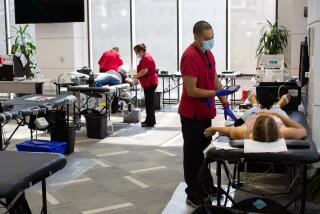The FDA and the sperm donor
- Share via
The way Trent Arsenault touts himself, he’s a tall, healthy and educated altruist who helps others by donating his sperm (sans sexual intercourse) on a fairly large scale. The way the U.S. Food and Drug Administration sees it, he operates a sperm bank, albeit an informal and unpaid one, that fails to meet federal regulations. From our perspective, the FDA is overreaching.
Arsenault, an electronics company engineer in the Bay Area, promotes his service through the Internet to women who want to get pregnant without paying the $400 to $600 fee that a commercial sperm bank would charge. On his website, Arsenault divulges details about himself (a 6-foot-1 blond bird-watcher who plays drums and volunteers at church) as well as listing the results of physical exams and the twice-yearly screening tests he undergoes to ensure that he’s free of HIV and other sexually transmitted diseases. What he doesn’t inform potential donees about are the porn videos he reportedly posts online.
But that’s not what bothers the FDA, which is more concerned that Arsenault’s tests for STDs aren’t nearly frequent enough to satisfy the federal regulations. Those require the donors at commercial sperm banks to be screened within a week of their donation. The agency has ordered Arsenault to stop his freelance activities or face prison time and a $100,000 fine.
But is that reasonable? There are, of course, no regulations that prevent a woman from being impregnated via a sexual encounter with a man she doesn’t know or who hasn’t been tested. Nor are there rules governing free sperm donations from friends and acquaintances — those men don’t have to be tested or meet other requirements. And there are no regulations that prevent a man from donating sperm to friends more than once.
Arsenault falls somewhere between professional donor — he has reportedly donated close to 400 times, and fathered 14 babies — and obliging buddy, but he’s closer to the latter in his own strange way. He refuses payment. He does not ship his donations; recipients must arrange for them to be picked up in person. His service is formal enough to include a simple contract.
Let’s be clear: Arsenault’s free service — and his video activities as reported on Gawker.com — strike us as off-putting and creepy. This isn’t a wise way for women to try to have a baby, both because of the less frequent screening and because they have to take the word of Arsenault — or whatever other freelance donor they find on the Internet — that the provider of sperm actually had the tests, that he won’t try to contact them in the future and that he’s actually the sort of person he makes himself out to be on his self-praising website. And while the savings is no doubt appealing, potential parents who can’t afford a few hundred dollars for the security of a sperm bank surely lack the money to raise a child.
Nevertheless, this is a decision women are capable of making for themselves. If men such as Arsenault represented a widespread, serious public-health danger, the government would be within its authority to intervene. They don’t, though, so the FDA is better off staying out of it.
More to Read
A cure for the common opinion
Get thought-provoking perspectives with our weekly newsletter.
You may occasionally receive promotional content from the Los Angeles Times.









